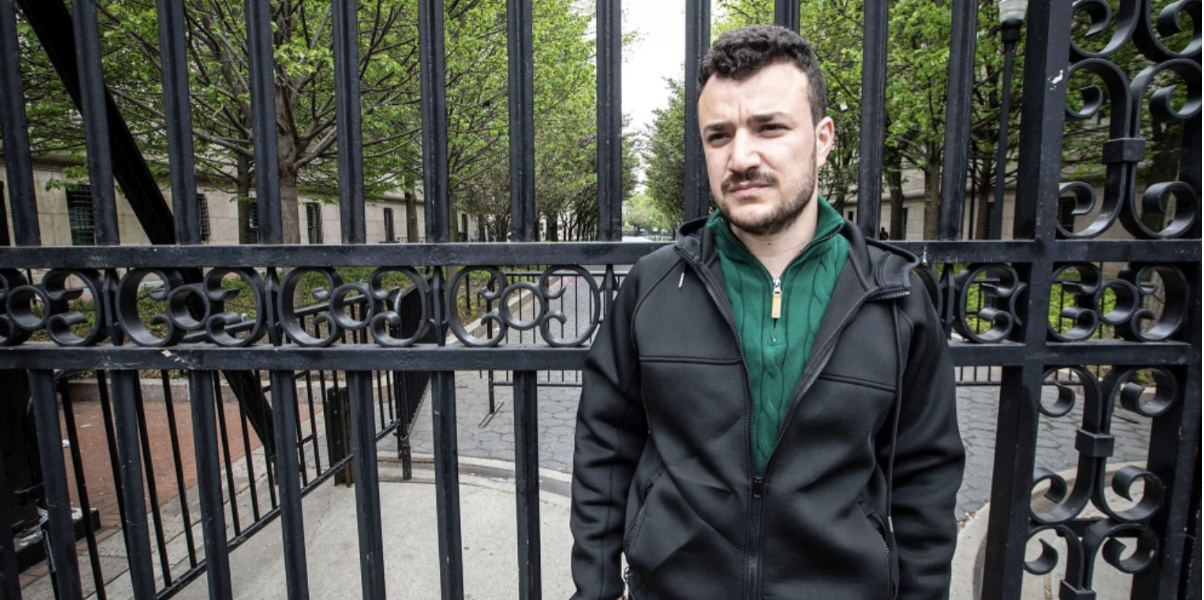Mahmoud Khalil by the gates of Columbia University on April 30, 2024.Seth Harrison / USA Today Network file
The U.S. Department of Justice (DOJ) filed new evidence against Columbia University graduate student Mahmoud Khalil, which states he did not report his pro-Palestinian organization participation during his green card application process. The Trump administration states that this missing information constitutes an independent reason for deporting him, although the original foreign policy reference has been withdrawn.
The Allegations
The Department of Justice submitted documentation on March 24, 2025, indicating Khalil intentionally kept secret his affiliation with Columbia University Apartheid Divest along with his United Nations Relief and Works Agency for Palestine Refugees (UNRWA) duties at the time he applied for his permanent residency in 2024. The officials at Border Patrol insist he failed to tell them he was responsible for program management jobs at the Syria Office of the British Embassy in Beirut.
The Department of Homeland Security (DHS) explains that hiding these facts from U.S. immigration officials can be considered fraudulent and deliberately misleading. Hence, Khalil risks rejecting his residency application and deportation from the nation.
Legal and Political Fallout
The legal representatives for Khalil have rejected the governmental accusations because they believe the persecution stems from his Palestine advocacy instead of any immigration violation. The attorney Baher Azmy denounced the DOJ’s allegations through his comments about them.
The new claims against Khalil that appeared after deportation proceedings began to demonstrate both the government’s understanding of unconstitutional and absurd foreign policy reasons for his deportation.
The legal ordeal for Khalil started when ICE agents apprehended him at his Columbia University residence on March 8, 2025. ICE agents briefly detained Khalil in New Jersey previous to his relocation to an ICE facility in Jena, Louisiana, on March 10. Immigration officials arrested Khalil upon a special executive provision that enabled the Secretary of State to deport people whose conduct had serious negative foreign policy consequences for the United States.
Judicial Intervention
After police detained Khalil, he submitted a habeas petition, which demanded release because his First Amendment, along with his Fifth Amendment rights,s had been violated. A New York federal judge prohibited the deportation of Khalil for an initial period because the case required a thorough judicial assessment. The Trump administration maintains its efforts to deport Khalil even though they now base their demand on deportation by pointing out his untruthful information during his immigration process.
Broader Implications
Khalil’s detention has sparked a national debate about academic freedom together with U.S. immigration approaches and the rights of political speech in the United States. Faculty members, together with students from Columbia University, defend his detention as establishing a worrying pattern that lets political opinions become a tool for deportation decisions against immigrant communities.
On March 25, 2025, Columbia University student activists and labor unions will stage protests to obtain three significant demands.
- Legal protections for international students
- The groups that support Palestinian activism should receive their previously eliminated funding.
- University authorities will return to their institution all students who received disciplinary punishment for supporting Palestine during demonstrations.
Khalil continues in detention as his lawyers fight to block his deportation on grounds of immigration fraud after asserting that the claims are political suppression in disguise.





